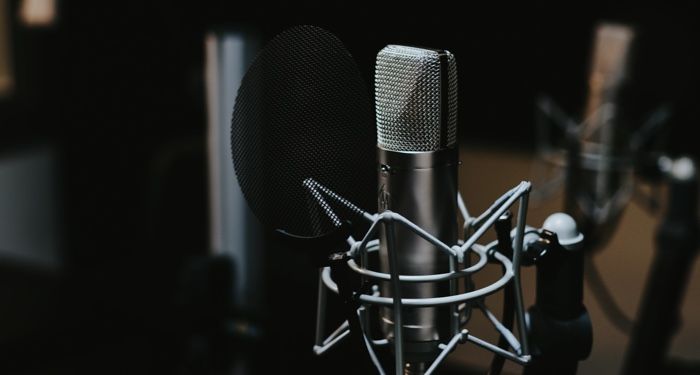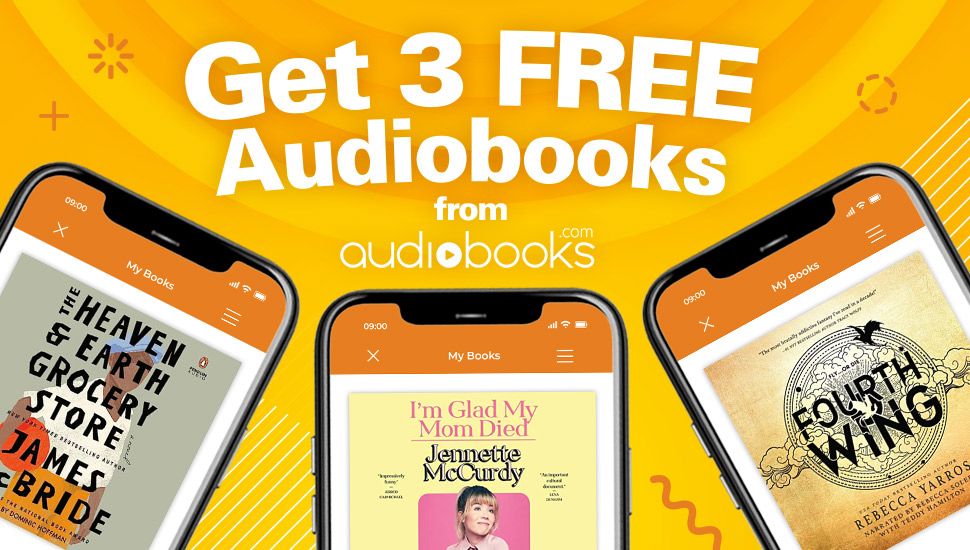
What I’ve Learned So Far Podcasting About Books
My first experience listening to podcasts dates back to 2017, when I started embroidering and decided to look up thread art shows. Later, when I considered opening an Etsy shop to sell my own embroideries — because yes, I used to believe you have to monetise a hobby in order to justify its costs — I stumbled upon The Merriweather Council podcast, focused on helping crafters sell on Etsy. Danielle is the podcast host and she posts an episode of about 15 minutes weekly, where she explains how one can sell on Etsy, which tools to use as a seller, and other tips for entrepreneurs specifically based on Etsy.
Although I picked a lot of great tips from The Merriweather Council, I lacked the time, patience, and discipline to make a handmade business work. But there is one thing I’ve learned from hearing Danielle and her podcast, which made me realise I could create one of my own: that you can podcast alone.
Up until that point, I was convinced that in order to host a podcast you needed to interview people. More than that, I thought that, in the same way TV and radio shows are fashioned, you had to be on the same spot with the person to make it work. With technology and remote recording, that is obviously not true. When I realised that, I started thinking that I could use my passion for communication to create something for fun: a hobby that would be pretty much free and therefore I did not have to monetise. It took me almost two years to finally take the leap and start recording, though.
At first I wasn’t sure what to talk about, since there were so many things I loved: embroidery, but also zero waste, and books. When I moved to Rotterdam in 2019 and started to immerse myself more in the world of books, eventually landing a job at a bookstore, I knew I had my topic.
As it is written on my bio, I change hobbies as the mood strikes, but books have always been a constant in my life and a topic I never tire to talk about. In 2020, A Story Of Sorts was born.
I posted my first episode in February, and every two weeks I would release a new one: short episodes between 15 to 30 minutes where I talked about the books I had read, events and book clubs I attended (that didn’t last long, as the pandemic hit the following month, but I continued to follow events online), and reviewing and recommending books. It was fun; I didn’t have much to lose besides free time, and it’s never a loss if you’re having fun. Which I was and still am.
After I found out about the easy free ways to do remote interviews (what do you mean these people aren’t actually in the same room, sometimes not even in the same continent? That’s possible?) I started interviewing authors and book lovers. Suddenly, the podcast was not just about me and my experiences as a reader, but it continued to be about that as well, while I went on to meet and chat with many amazing people.
Of course, when you do something for a certain amount of time and you want to continue doing it, it is inevitable to not look back and wonder what you would have done differently, or the ways you can improve in the future.
If you are on the verge of, or wondering if you should start a podcast, and would like to hear some tips and — dare I say — words of encouragement for someone who has been doing this for two years and is launching a third season soon, here they are. They’re obviously not full proof, and they relate closely to my own experience, but they’re being offered in good faith and I hope they can be helpful. The same way The Merriweather Council taught me that I could start a podcast on my own, I hope you can learn from what I have to share below.
Podcast Doesn’t Have To Be Yet Another Hobby To Monetise
Just to reiterate what I said above: I am aware most people with a podcast would be more than happy to make it their full time job, or at least to get some profit out of it. But with so many choices of podcasts out there, it can be rough to stand out, especially when you don’t have a lot of time and money to invest in it. And that’s okay. It is perfectly fine to create content for fun, without expecting — or even wanting — it to become a big hit.
It’s Vital To Plan Ahead
For the last season of A Story Of Sorts, which kicked off in January 2021, I started interviewing people around November 2020. After a couple of months, I had a good chunk of recorded episodes under my sleeve, so I relaxed. Problem is, I relaxed a bit too much, and ended up exhausting the interviews I had available before I had enough time to plan new ones, edit them, and do everything that needs to be done for them to be online. A big part of the year I was doing the final edits of interviews the day before they were supposed to be up. And stressing out about it.
Now, you’re thinking, why stressing out? Surely, it’s just a hobby? Yes, but consistency is key for a podcast, and although mine is a small one, I like making sure episodes all go out on the same day of the week. I could have definitely planned them with more time to avoid creating that stress for myself.
For season 3, I prepared the episodes way ahead of time, and will now be able to do things in a more relaxed manner.
Of course this isn’t always possible for everyone: some people podcast about daily news, but it is important to remember to prepare as much as possible beforehand. As an example, I use the same intro and outro in each episode. That way there’s at least one thing I don’t need to record every time, and it gives the podcast something to be recognised by.
Save Everything
Sometime last year I lost all my designs made with Canva, just as season 2 was coming to an end. I have no idea what happened, since the designs are supposedly automatically saved, but I didn’t have any copy of the basic designs outside of the Canva website.
It took me a lot more time and frustration to be able to copy the designs I used all year long to give some consistency to the two last episodes of the season, so now I make sure I use an external disc or Dropbox to save the code of the colours I use, fonts, etc.
I’ve also invested on an external hard drive to save my Zoom videos and edited audio files.
Consistency Is Key
When I asked people what they find important in podcasting, they always directed me to consistency. Thinking about the ways I’ve consumed podcasts in the past, I agree.
When a podcast comes out on the same day of the week, it is easier to remember to listen to it. It becomes part of a routine, and listeners are more likely to tune in consistently as well.
Although this so called consistency isn’t always something everyone can offer for various reasons, when at all possible, it is preferable to use it as a tool.
Size Doesn’t Matter, It’s What You Do With It
In the end, it’s all about content.
I’ve had episodes of 15 minutes do pretty well in terms of downloads, but I also had one episode that lasted two hours (a conversation I had with a Tika Viteri about pretty much any- and everything) have more downloads than average, which I did not expect for such a long episode.
I know some people worry that no one will listen to their 15 minute episode, but in my experience, short episodes tend to work pretty well. If people like whatever they’re listening to, they’ll give you the time of day. Even if it’s just a quarter of an hour.
It is better to follow your gut and make the episode as long or as short as you need it to be. If it makes sense to be that short, and it contains valuable content, people will listen (sometimes the valuable content is simply you ranting about a book: and that’s okay).
Equipment Can Be A Useful Tool, But It Isn’t Everything
I listened to podcasts with crappy sound simply because I was interested in the subject and how it was tackled.
I know a lot of people believe they have to spend a lot of money on equipment if they want to make it work, but it is okay to start with what you have and improve as you go.
I started with a borrowed microphone and my laptop, but I know of people who use their phones to record and edit and are doing just fine. It’s mostly about putting a message out there, and enjoying the process.
Getting People To Talk To You Is Easier Than You Think
This is a reminder for myself as well, backed up by the almost 40 people I have invited for interviews who have all said yes.
When I finally decided to start interviewing people, I asked in the places where I knew it was safe to ask. Until this day, I’ve been interviewing mostly people I know one way or another, or people who come to me and ask if they can be on the podcast.
In the future, I want to start reaching out to people I don’t know, who are not in the same circles as I am, and who have no reason to accept my invitation — or may even consider my podcast too small to waste time with.
You only miss the shots you don’t take, am I right?
And hey, I’ve interviewed Adiba Jaigirdar (The Henna Wars, Hani And Ishu’s Guide To Fake Dating) and Crystal Maldonado (Fat Chance, Charlie Vega), who I absolutely love, in the same season. If that’s not a proof that going for it and hoping for the best sometimes works, I dunno what is.
There Are So Many Free Tools Available
Audacity for audio edition, Canva to create advertisement tools and logos, Headliner to make audiograms and captions, Podpage as a free website, Airtable for organising, Podmatch to find guests, Podcorn to get sponsors, Linktree to have all links in one place, and Anchor as a free hosting platform: these are all tools that I use to keep the podcast going without spending extra money on it. They’re easy to work with, quite intuitive, and handy if you’d like to go a bit beyond the basic recording, editing, and posting.
These are only a few of the many free tools out there. Depending on what your objective for the podcast is, and what you can spend on it, there are options within various budgets that will improve your podcast just a bit more.
Do What Works For You
This goes back into the it’s a hobby reminder, but it has more to do with social media and all the ways available to publicise the podcast in order to reach as many people as possible.
Last year I created a Facebook and a Twitter account specifically for the podcast, which were supposed to complement my Bookstagram and serve as a marketing tool. It didn’t work for me. I quickly understood that most of the times I kept forgetting to update the pages, and doing it was a hassle, so I simply connected the podcast to my personal pages and considered myself happy.
I don’t do much on Facebook and my main listeners aren’t using it much anyway, so I focused mainly on Instagram — where I already had a bookish account — and on my personal Twitter page. I’m the face of the podcast, and it’s easier to go with the followers I already have than to build a whole new community of people under my podcast’s name.
I am not good at curating several social media accounts, so keeping my podcast in these two spots is the key.
Apps like IFTTT, which post in various platforms all at once, are also great for those who want to reach people across mediums without too much hassle.
It is Never Going To Be Perfect
Sometimes I’m happy with the episodes I put out, the way I talked, the things I said, the questions I asked. Sometimes I listen back and realise that a particular episode turned out worse than I had hoped for.
It’s okay to feel this way, and you’re most likely to be your own worst critic. Keep doing it.
Practice may never end up making perfect, but that doesn’t mean you won’t improve and enjoy it while failing terribly.
It’s your podcast. Have fun.
Want to read more about podcasts and podcasting? Here are a few links for you!
- How I Started My Book Podcast (And You Can Too)
- 33 Of The Best Book Podcasts For All Genres
- 11 Of The Best Comic Books Podcast
And don’t forget to check out Book Riot’s stable of podcasts!













